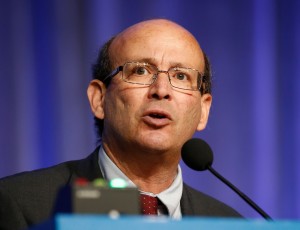DC court enjoins Public.Resource.org from printing public safety regulations online
Carl Malamud is the founder of Public.Resource.org. ABA file photo by Tony Avelar.
A federal judge in Washington D.C. has sided with three major standards-development organizations seeking to prevent Public.Resource.org from printing their technical and scientific guidelines online.
Robert Ambrogi’s LawSites reported that the U.S. District Court for the District of Columbia issued a permanent injunction earlier this month, against Public.Resource.org in favor of three major standards-development organizations: the American Society for Testing and Materials, the National Fire Protection Association, and the American Society of Heating, Refrigerating, and Air-Conditioning Engineers. The three standards-development organizations had filed suit in 2013, accusing Public.Resource.org of copyright infringement for publishing parts of their model codes and regulations online without a license.
Carl Malamud, CEO of Public.Resource.org, had maintained that the regulations that had been incorporated by reference into the federal code could not be copyrighted and were open and freely accessible to the general public.
The government often relies on private standards-development organizations to come up with model rules and regulations that deal with everything ranging from safety standards to composition of materials and almost everything in between. Standards-development organizations usually sell access to their model codes and regulations, and the three standards-development organizations suing Malamud claimed the rules that had been incorporated by reference into the federal code were freely available on their websites.
Malamud had argued that these rules weren’t really available to the public, since users had to go onto the standards-development organizations’ websites and read the rules in a special reading room.
“I’d like to make these codes available on all mobile devices,” Malamud told the ABA Journal in a June 2014 feature. “If one body wants to restrict their materials to their reading room, then it stifles innovation. My right as a small nonprofit is to take this information and make it better and more efficient for users.”
“Importantly, there is no evidence that the [standards-development organizations’ standards] are unavailable to the public,” U.S. District Judge Tanya Chutkan wrote in her opinion. “In fact, the undisputed record evidence shows that the standards are required to be available in physical form.” Chutkan also held that “while defendant argues that the public requires greater access to the standards—in particular, free online access in formats other than read-only—that is a policy judgment best left to Congress.”
Malamud stated in a tweet that he would appeal the ruling. However, he also praised the court for its “thoughtful and well-written” opinion.
Mitch Stoltz, senior staff attorney at the Electronic Frontier Foundation, who had helped represent Malamud, was critical of the opinion, writing at the organization’s Deeplinks Blog: “The district court’s decision runs contrary to decisions in other parts of the country, and raises serious constitutional issues. We don’t see how the decision can be reconciled with the due process right to know the law nor our First Amendment right to share it.”
“The court’s ruling means federal, state and local agencies can continue to rely on not-for-profit [standards-development organizations] to develop voluntary consensus standards at the highest level of excellence and at minimal cost to government,” said Kathie Morgan, President of ASTM International, in a statement.
At the 2016 ABA Annual Meeting, the policymaking House of Delegates passed Resolution 112, which asked Congress to pass legislation requiring federal agencies to make the relevant portion of those privately drafted standards available to the public online.




